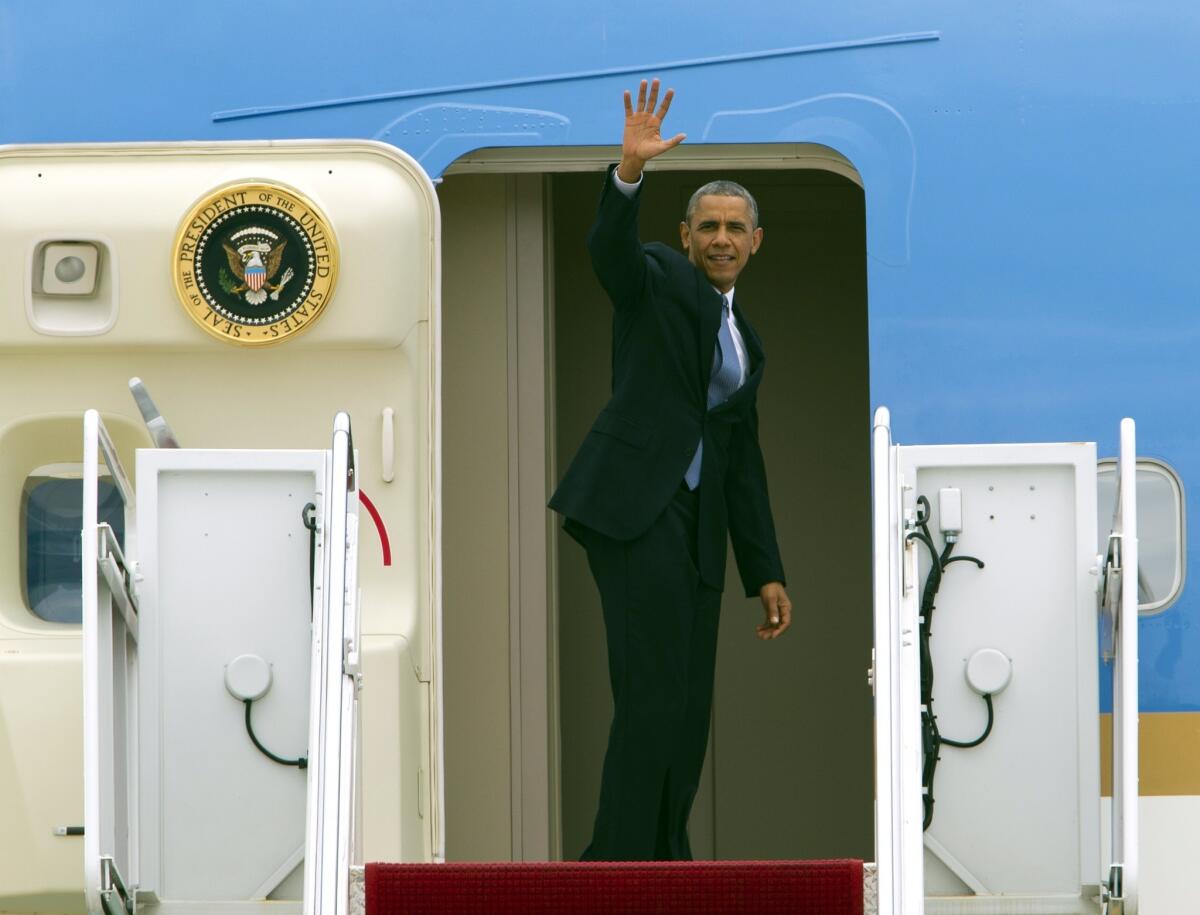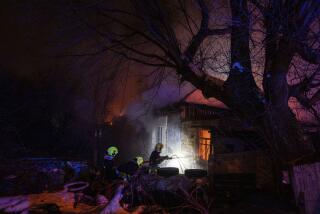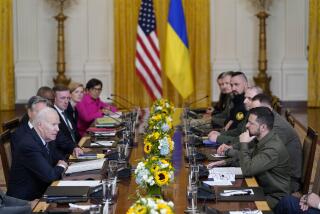Obama stays low-key on Ukraine, waits for Europe to take bigger role

In the week since the downing of a Malaysia Airlines passenger jet snapped the world’s attention onto the war in Ukraine, President Obama has made three statements, called several world leaders, identified the parties responsible and repeatedly expressed moral outrage.
But he has not yet said what, if anything, he plans to do in response.
That no-drama approach has drawn fire from domestic critics and skepticism from some allies: Both groups say an American president should be more active in responding to a tragedy that killed 298 people and has the potential to escalate a European war.
U.S. intelligence agencies believe pro-Russia separatists in eastern Ukraine shot down the jet by mistake, not realizing it was an airliner, senior American officials said Tuesday. The intelligence indicates the separatists used a surface-to-air missile launcher provided by Russia, the officials said.
Meanwhile, Obama’s insistence on keeping to his schedule of fundraisers, lighthearted lunches and political travel has become fodder for partisan debate.
White House officials contend that their relatively low-key response serves a strategic purpose, calibrated to fit the complicated politics at play in Europe and the delicate diplomacy involved in clearing and investigating the wreckage site.
Administration officials insist they are playing a long game, giving Europe time to form its own response and, they hope, to finally take a harder stand against Russia for its role in fueling the Ukrainian conflict.
After months of watching European leaders drag their feet on imposing sanctions strong enough to rattle Russian President Vladimir Putin, administration officials say they are cautiously hopeful that the downing of Malaysia Airlines Flight 17 will be a pivot point.
For now, the White House wants to let pressure from outraged publics within Europe — rather than prodding from a U.S. president — do the work. Launching into heated rhetoric that would frame the debate as a Moscow versus Washington confrontation would be counterproductive, U.S. officials say.
Some indication of whether the administration’s hope will be realized should come this week as European foreign ministers debate further sanctions. At an initial meeting Tuesday, “deep sorrow, but also increasing anger,” over the shooting down of the plane set the tone, Swedish Foreign Minister Carl Bildt wrote in a Twitter message.
Obama spoke by phone Tuesday with Dutch Prime Minister Mark Rutte, whose country lost 193 people on Flight 17, which was flying from Amsterdam to Kuala Lumpur, Malaysia. The two agreed that the European Union and the U.S. “must remain united with regard to events in Ukraine and that Russia will face increasing costs if it continues its support for violent separatists and fails to cease its efforts to destabilize Ukraine,” the White House said in its account of the call.
But the Europeans remained divided. The foreign ministers agreed to a limited list of new sanctions but put off decisions on more consequential penalties until later this week.
Washington has sometimes shown impatience with that sort of slow European process. Just the day before the downing of Flight 17, for example, the U.S. had issued a new set of sanctions against Russia. That move came after months of largely fruitless hope that the Europeans would take similar action on their own.
The decision “was sort of an act of frustration; the White House wanted to do this in tandem with Europe,” said Heather Conley, an expert on U.S.-European diplomacy at the Washington-based Center for Strategic and International Studies.
The tension over how directly to confront Russia plays out against a background of rocky relationships that Obama and his top aides have had with some European allies.
Early in Obama’s tenure, the administration’s efforts to intervene in the European economic crisis often irked more than it helped, some European leaders said. Obama’s hope for a massive trade deal across the Atlantic seems distant. And in the last year, relationships, particularly with Germany, have eroded under the weight of documents leaked by former National Security Agency contractor Edward Snowden and the unmasking of U.S. spies in German ministries.
Administration officials have often talked of wanting to see Europe take a more active role in providing for its own defense and security needs. That theme long predates Obama’s tenure. What makes the Obama approach different is the apparent belief by the president and his top aides that hanging back will encourage the Europeans to step forward.
Many U.S. experts express skepticism about that idea. In the current crisis, some leaders, notably British Prime Minster David Cameron, seem freshly mobilized for tougher sanctions; others, particularly those in France and Southern European nations with fragile economies, appear more reluctant to risk economic turmoil at home to punish Putin.
French President Francois Hollande has not stopped a massive arms deal with Moscow, saying the deal will depend on Russia’s attitude toward the downing of the plane.
“The White House is just going to have to show leadership here,” Conley said. She suggested the U.S. may have to consider measures that would force European businesses to choose between access to American financial institutions and access to Russian ones.
Sen. Dianne Feinstein (D-Calif.), chairwoman of the Senate Intelligence Committee, is among Democrats who have prodded Obama to take a more active stance.
“This is a very hard time,” Feinstein said in a recent interview on MSNBC, citing the turmoil in the Middle East as well as the troubles in Ukraine. “I’m not going to tell the president what to do, but I think the world would very much respect his increased attention on this matter, and I think there ought to be increased attention.”
For now, however, the White House has not indicated that it’s looking at dramatic new steps.
Instead, the president is keeping to a schedule. On the day of the crash, Obama stuck to a planned barbecue lunch with a Delaware woman, followed in the evening by fundraisers for Democratic House and Senate candidates. On Tuesday, he headed to the West Coast for a string of Democratic fundraising events.
White House officials say the president can do his job from wherever he is, noting that, like every modern president, he travels with his aides and secure phone lines.
“As was demonstrated last week when the president was on the road and two of these crises flared up, the president was able to fulfill his responsibilities as commander in chief and as the leader of this country from the road,” White House Press Secretary Josh Earnest said during his daily White House briefing Monday.
Still, officials have shown some signs of sensitivity to the image of a president looking too unruffled by tragedy. Late Monday, the White House announced the president would not be cracking jokes with late-night talk show host Jimmy Kimmel during the California leg of this week’s trip, although officials acknowledged they had been in touch with Kimmel about an appearance on his program.
And Tuesday morning, before leaving for the West Coast, Obama made an unscheduled trip to the Dutch Embassy, where he wrote a note in a condolence book talking of the “deep ties of friendship between our two countries.”
“Bound by that friendship, we will not rest until we are certain that justice is done,” he wrote.
More to Read
Start your day right
Sign up for Essential California for news, features and recommendations from the L.A. Times and beyond in your inbox six days a week.
You may occasionally receive promotional content from the Los Angeles Times.







